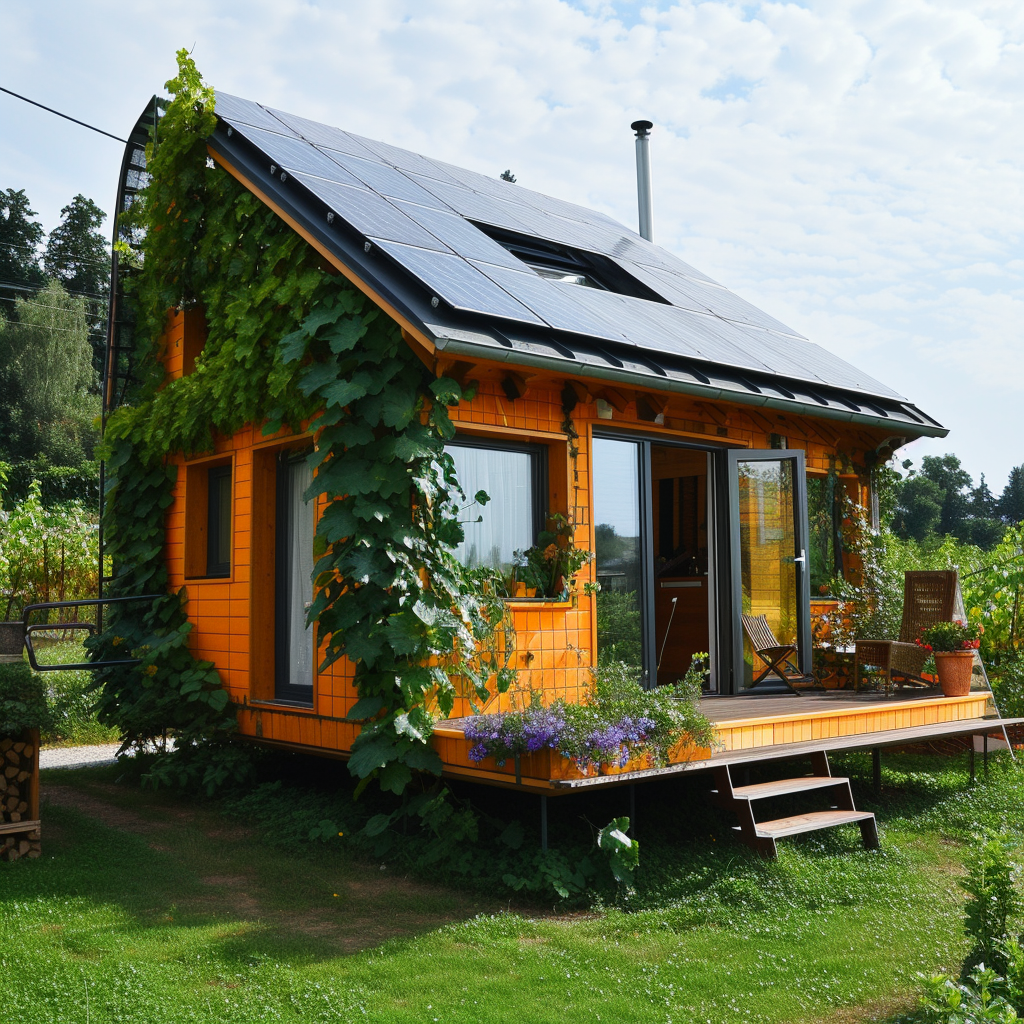So, here’s the thing: when it comes to off-gridders, there’s always a lot of curiosity about how they manage the fundamental things in life. And these days, one topic that often comes up is how do off-gridders handle childbirth or raising babies? I mean, it’s a fair question, right? Living off the grid means no hospitals or easy access to modern conveniences. But let me tell you, after doing some digging, I’ve discovered that off-gridders are a resilient bunch, and they have some pretty interesting and resourceful ways of bringing babies into the world and giving them a kick-start in life.
Off-Grid Living and Parenting
Living off the grid is a lifestyle choice that involves disconnecting from mainstream utilities and relying on sustainable and alternative sources for energy, water, and food. This way of life allows individuals and families to become self-sufficient and reduce their environmental impact. However, when it comes to parenting, off-grid living presents unique challenges and advantages. In this article, I will explore the different aspects of off-grid parenting, from preparing for childbirth off the grid to meeting the healthcare and educational needs of off-grid children.
Understanding the Off-Grid Lifestyle
Living off the grid means having to rely on alternative methods for everyday necessities. This often involves generating electricity through solar panels or wind turbines, collecting rainwater for use, and growing food through organic farming practices. Those who choose this lifestyle prioritize self-sufficiency, sustainability, and a closer connection to nature. It also often involves living in remote locations, away from urban areas, which can pose additional challenges when it comes to healthcare and socialization for children.
Challenges and Advantages of Off-Grid Parenting
Although off-grid parenting offers numerous benefits, such as reduced exposure to environmental toxins and a simpler lifestyle, it also brings unique challenges. One of the main challenges is the lack of easily accessible medical facilities during childbirth and emergencies. Off-grid parents may need to plan and prepare for these situations in advance, which we will further discuss in later sections. Additionally, off-grid children may face limited socialization opportunities, as they are often living in remote areas. However, off-grid parenting also allows for more freedom and flexibility in raising children, prioritizing hands-on learning experiences and practical life skills.

Preparing for Childbirth Off the Grid
Choosing the Right Off-Grid Location
When preparing for childbirth off the grid, it’s crucial to select the right location that meets the needs of the entire family. Factors to consider include access to natural resources, proximity to emergency medical facilities, and the availability of support networks. Being close to reliable water sources and having enough land for food production can also be important considerations for sustainable living. It’s essential to research and visit potential locations to ensure they align with your values and provide the necessary resources for a safe and healthy birth.
Creating a Safe and Suitable Living Environment
Creating a safe and suitable living environment is of utmost importance for off-grid parents, especially when preparing for childbirth. Sustainable housing options such as straw bale houses or Earthships can provide natural insulation and energy efficiency. Installing alternative power sources like solar panels and rainwater collection systems can also contribute to a self-sufficient lifestyle. Additionally, ensuring that the living environment is free from potential hazards, such as sharp objects and toxic substances, is essential for the safety of both parents and children.
Educating Oneself on Alternative Birth Methods
Off-grid parents often choose alternative birth methods to give birth in a natural and self-reliant manner. These methods include home births with the assistance of midwives, water births using natural resources like birthing pools or rivers, freebirth or unassisted childbirth, and the support of doulas or birth assistants. It is crucial for off-grid parents to educate themselves on the options available and choose what aligns best with their personal beliefs and circumstances. Consulting with experienced professionals and attending childbirth education classes can provide valuable insights and guidance.
Alternative Birth Methods
Home Births with Midwives
Home births with the assistance of midwives have become increasingly popular among off-grid parents. Midwives are trained healthcare professionals who specialize in providing holistic and personalized care during pregnancy, childbirth, and the postpartum period. They offer support and guidance to parents, ensuring a safe and comfortable birth experience in the familiar surroundings of their own home. Midwives can also provide antenatal and postnatal care, including essential check-ups, emotional support, and lactation assistance.
Water Births using Natural Resources
Water births, where the mother gives birth in a tub or pool of warm water, have gained popularity in both traditional and off-grid settings. For off-grid parents, water births offer a natural and soothing environment for childbirth. The buoyancy of water can provide pain relief and help the mother relax during labor. It is crucial to ensure the water source is clean and safe. Natural bodies of water such as rivers or lakes can provide an alternative for off-grid parents who wish to have a water birth.
Freebirth and Unassisted Childbirth
Freebirth, also known as unassisted childbirth, involves giving birth without medical intervention or professional assistance. It is a choice made by some off-grid parents who value autonomy and trust in the natural process of childbirth. Freebirth allows for complete control over the birth experience and allows the mother to listen to her body’s instincts. However, it is important to note that freebirth should only be considered by well-informed and low-risk individuals who have access to emergency medical services if needed.
Using Doulas and Birth Assistants
Doulas and birth assistants play a crucial role in supporting off-grid parents during childbirth. Doulas provide emotional and practical support throughout the entire birth process, offering continuous reassurance and comfort to the mother. Birth assistants, on the other hand, may have a more active role and assist with the technical aspects of childbirth, such as monitoring vital signs and providing pain relief techniques. Having a doula or birth assistant during off-grid births can provide peace of mind and an extra level of support for the parents.
Safety Considerations for Off-Grid Births
Emergency Contingency Planning
When planning for an off-grid birth, it is essential to have emergency contingency plans in place. This includes preparing for potential complications during childbirth and ensuring access to professional medical assistance if needed. Off-grid parents should familiarize themselves with common childbirth emergencies and learn basic emergency procedures, such as neonatal resuscitation and managing postpartum bleeding. Creating a detailed birth plan that outlines steps to be taken in various scenarios can help parents feel prepared and confident during the birthing process.
Accessing Medical Facilities during Complications
While off-grid parents may prefer to give birth at home, it is vital to have a backup plan in case of complications that require medical intervention. This may involve researching and identifying the nearest medical facilities and transportation options in case of emergencies. Off-grid parents should establish a communication plan to quickly reach medical professionals if needed. Regular check-ups with healthcare providers during pregnancy are also important to monitor the health of both the mother and baby.
Training in Basic Emergency Medical Procedures
Off-grid parents should consider receiving training in basic emergency medical procedures to ensure the safety of their family. Courses such as First Aid and CPR can provide valuable skills and knowledge in responding to medical emergencies. Learning how to identify and address common issues that may arise during childbirth, such as shoulder dystocia or umbilical cord prolapse, can be crucial in providing immediate care while waiting for professional medical assistance to arrive.
Supportive Community and Networking
Building a Support Network of Like-Minded Individuals
Living off the grid can sometimes be isolating, especially for off-grid parents. Building a supportive community of like-minded individuals can provide a sense of belonging and valuable resources. Connecting with other off-grid families, attending local gatherings or workshops, and participating in online forums or social media groups can help foster a sense of community. Sharing experiences, exchanging knowledge, and offering support to one another can greatly enhance the off-grid parenting journey.
Online Resources and Forums for Off-Grid Parents
The internet offers a wealth of resources and forums specifically tailored to off-grid parents. Online platforms provide a convenient way to connect with others, share experiences, and seek advice on various off-grid parenting topics. Websites, blogs, and social media groups dedicated to off-grid living and parenting can be excellent sources of information and support. Additionally, virtual events and webinars hosted by experienced off-grid parents can offer valuable insights and guidance.
Sharing Skills and Experiences within the Community
One of the advantages of being part of an off-grid community is the opportunity to share skills and experiences. Off-grid parents can benefit from participating in skill-sharing activities such as workshops or cooperative projects. Sharing knowledge about sustainable living practices, organic gardening, natural remedies, and alternative education methods can enrich the community as a whole. By pooling resources, supporting each other, and learning from shared experiences, off-grid parents can create a strong and resilient network.
Providing Healthcare and Vaccination Off the Grid
Natural Health Remedies and Alternative Medicine
Off-grid parents often explore natural health remedies and alternative medicine to meet their family’s healthcare needs. They may turn to herbal remedies, essential oils, or homeopathy for common ailments and minor injuries. However, it is important to approach alternative medicine with caution and consult with qualified professionals when needed. Off-grid parents should educate themselves on the benefits and limitations of natural health remedies and be aware of potential interactions or contraindications.
Developing First Aid Skills
Being proficient in first aid is crucial for off-grid parents, as access to emergency medical services may be limited. Parents should learn basic first aid techniques to address common injuries, such as cuts, burns, and strains. Additionally, acquiring knowledge on advanced first aid skills, such as splinting fractures and administering CPR, can be life-saving in critical situations. Regular practice and updating skills through refresher courses are necessary to maintain proficiency in emergency response.
Making Informed Decisions about Vaccination
Vaccination is a topic of debate and personal choice among parents, regardless of their chosen lifestyle. Off-grid parents should conduct thorough research, consult with healthcare professionals, and make informed decisions based on their family’s unique circumstances. It is important to weigh the risks and benefits of vaccines, considering factors such as the prevalence of diseases in the area and potential exposure risks. Maintaining open communication with healthcare providers and accessing credible sources of information can help off-grid parents make informed choices regarding vaccination.

Nutrition and Feeding Practices
Growing and Sourcing Organic, Locally-Produced Food
Off-grid parents often prioritize sustainable and organic food practices, which includes growing their own food or sourcing locally produced options. Organic gardening allows families to have control over the quality of the food they consume, minimizing exposure to harmful chemicals. Setting up permaculture systems, utilizing vertical gardening techniques, and practicing composting are sustainable methods that off-grid parents can employ to provide nutritious and fresh produce for their children.
Breastfeeding and Alternative Feeding Methods
Breastfeeding is a natural and convenient feeding option for off-grid parents, providing optimal nutrition and immune support for the baby. For off-grid parents who are unable to breastfeed or choose alternative feeding methods, there are various sustainable options to consider. Utilizing goat or cow milk from ethically raised animals, making homemade formula using natural ingredients, or exploring milk-sharing networks within the off-grid community can provide alternatives to commercial formula.
Preparing Homemade Baby Food
Preparing homemade baby food allows off-grid parents to have control over the ingredients and quality of the food their children consume. This approach aligns with the off-grid values of sustainability, self-sufficiency, and reducing waste. Off-grid parents can utilize organic fruits, vegetables, and grains from their own gardens or local sources to create nutritious and wholesome meals for their infants. This practice fosters a connection with the food production process and promotes healthy eating habits from an early age.
Education and Socialization for Off-Grid Children
Unschooling and Alternative Education Approaches
Off-grid parents often opt for alternative education approaches, such as unschooling, to provide a customized and holistic learning experience for their children. Unschooling focuses on child-led learning, where children explore their interests and passions in a self-directed manner. This approach allows children the freedom to learn at their own pace and pursue subjects that genuinely interest them. Off-grid parents can facilitate learning by providing resources, encouraging hands-on exploration, and embracing real-world experiences.
Implementing Sustainable and Practical Life Skills
Living off the grid offers numerous opportunities for off-grid parents to teach their children practical life skills. From sustainable energy generation to organic gardening, children raised off-grid are exposed to a wide range of skills that promote self-sufficiency and resilience. Off-grid parents can involve their children in daily tasks and chores, such as collecting rainwater, tending to animals, and building or repairing structures. This hands-on approach fosters a sense of responsibility, independence, and practical problem-solving abilities.
Creating Opportunities for Social Interaction
While off-grid living can sometimes lead to limited socialization opportunities, it is essential for off-grid parents to create avenues for their children to interact with peers. Attending local community events, participating in homeschooling co-ops, and organizing gatherings with other off-grid families can facilitate social interaction. Outdoor activities, such as nature exploration, hiking, or participating in community projects, can also provide opportunities for children to build social skills and form meaningful connections.
Parental Roles and Time Management
Balancing Parenting and Off-Grid Responsibilities
Off-grid parenting requires balancing the demands of parenting with the responsibilities of maintaining an off-grid lifestyle. This can be particularly challenging, as off-grid living often involves more manual labor and time-consuming tasks. Effective time management, prioritization, and delegation of tasks within the family unit can help maintain a healthy balance. Finding a routine that works for both parents and children, involving everyone in daily tasks, and establishing clear expectations and boundaries are important aspects of balancing off-grid responsibilities and parenting duties.
Involving Children in Daily Tasks and Chores
Off-grid parents often involve their children in daily tasks and chores to promote a sense of responsibility, self-sufficiency, and shared ownership of the off-grid lifestyle. Age-appropriate tasks can range from helping with gardening and animal care to assisting with meal preparation or off-grid maintenance. Involving children in these tasks not only lightens the parents’ workload but also provides valuable learning opportunities and a sense of accomplishment for the children.
Supporting Each Other as Co-Parents
Maintaining a strong and supportive partnership is crucial for off-grid parents, as the challenges and responsibilities of off-grid parenting can be demanding. Open and honest communication, sharing parenting responsibilities, and practicing self-care are essential in fostering a healthy co-parenting dynamic. Supporting each other emotionally, physically, and mentally can provide the foundation for a thriving family unit and a successful off-grid parenting journey.
Addressing Legal Requirements and Documentation
Registering Birth Off the Grid
Off-grid parents may need to navigate legal requirements surrounding the registration of their child’s birth. This can vary depending on the jurisdiction and local regulations. It is important for off-grid parents to research and understand the legal obligations concerning birth registration and obtain the necessary documents, such as birth certificates or affidavits, to ensure compliance. Consulting with legal professionals or local government authorities can provide clarity and guidance in this process.
Ensuring Compliance with Child Protection Laws
Off-grid parents must also ensure compliance with child protection laws and regulations that are in place to safeguard the well-being and rights of children. This includes meeting requirements related to healthcare, education, and overall child welfare. Staying updated on local child protection laws, attending regular check-ups, and maintaining detailed records of healthcare and educational practices can help off-grid parents demonstrate their commitment to their children’s well-being within legal frameworks.
Securing Necessary Identification Documents
Off-grid families may face challenges when it comes to securing necessary identification documents, such as passports or social security cards, especially if they have chosen to live off-grid from birth. Off-grid parents should research and understand the identification processes and requirements in their jurisdiction and ensure they have the necessary documentation in place for their child’s future needs. Seeking guidance from legal professionals or government agencies can provide assistance in navigating these procedures.
In conclusion, off-grid living and parenting present unique challenges and advantages for individuals and families seeking a self-sufficient and sustainable lifestyle. From preparing for childbirth off the grid to meeting the healthcare and educational needs of off-grid children, off-grid parents must navigate a range of considerations. By choosing the right off-grid location, educating themselves on alternative birth methods, ensuring safety during childbirth, building a supportive community, addressing healthcare needs, providing nutritious food, and prioritizing education and socialization, off-grid parents can create a fulfilling and enriching environment for their children. It is important for off-grid parents to research, plan, and stay informed to successfully navigate the intricacies of off-grid living and parenting.




